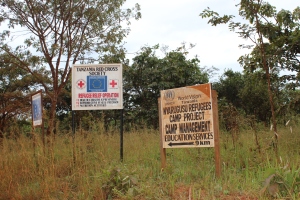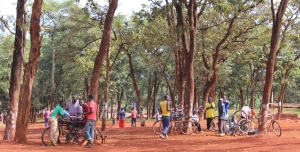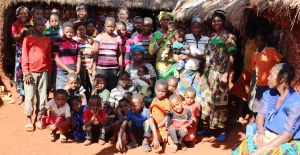“Welcome to the refugee camp,” says my husband in his matter-of-fact voice.
We had just arrived at the main UN headquarters in Nyarugusu refugee camp. I glance around my surroundings. People were gathered in clusters – some standing with bicycles, others holding children, others sitting on log benches under trees. I saw one woman trying to submit a paper to the UN through a gate. Everything seemed to move in slow motion: maybe because people don’t have jobs to rush to, farms to cultivate, food to gather, and they cannot leave the camp. We drive to my in-laws’ home. My husband directs the driver: “turn left here; take a right at the next dirt road; I remember walking this road so many times.” His family has lived in the refugee camp for 18 years.
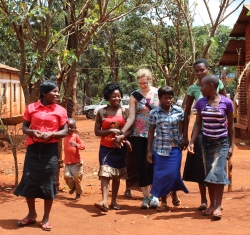
Meeting my sisters-in-law for the first time! They welcomed me with such love. Copyright. All rights reserved.
Multiple women burst out of the house and run to the car to greet us: “Kaka! Wifi!” Hugs, joy, laughter, tears…I was overwhelmed by the love and joyful embrace of my sisters-in-law. It’s such a joy and honour to finally meet my new family: Mom, Dad, sisters, and extended family. The language barrier made communication very difficult, and we did our best to communicate in English and Swahili. This was a really humbling experience for me. Nonetheless, we found ways to talk, make jokes, and share about our lives. I love and appreciate each of them. As we gather for lunch, extended family and close friends arrive. There must have been at least 70 people: aunts, uncles, nieces, nephews, children of nieces & nephews, grandchildren… half the family appears to be under 30. I meet my new brothers, cousins, sisters, nieces, nephews. I struggle to ask questions in broken Swahili: “Habari za shule [How is school]?” “Nzuri [Good],” they respond.
Students persevere in their studies: primary school attendance in the refugee camp is 97% and secondary school is 87%. They face dilapidated buildings, few latrines (washrooms), 1 teacher for 50-100 students, 5-9 students per school desk, and 10 students per textbook. On top of this, girls face further barriers: the risk of rape, as they travel long and isolated distances to collect firewood; early marriage; and pregnancy. Despite these challenges, high school students in the refugee camp excel: last year, they wrote the DR Congo national exam and came out top of the region that they are connected to in DR Congo.Without scholarships, however, they have no opportunity for post-secondary education (DFID, 2013).
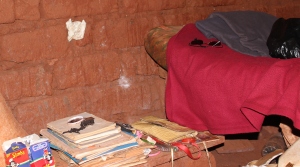
High school students in the refugee camp excel despite lack of materials, teachers, schools, latrines, and other social barriers. Copyright. All rights reserved.
As I sit with my new family, my sister-in-law slips me a brown paper envelope. “This is for you.” I open it: Dear Madam, I hereby humbly request assistance for a university scholarship. I am a Congolese by citizenship. I have a high school certificate and have worked 4 years as a secondary school teacher. I would deeply appreciate your assistance in seeking a scholarship. Although employed by the UN, teachers receive only 18,000 Tanzanian shillings per month (~$11 CDN). To compare, 1lb. peanuts costs 2,000 TZ shillings. I didn’t know what to say. I imagined myself in this young man’s situation: a young man my age, who has no hope of leaving the refugee camp unless he has funds to study. I felt guilty that my home country has provided me with so many opportunities in life, yet he has been denied even the basics to survive. I knew was also frustrated that I couldn’t promise a scholarship in that moment. Later that evening, I finally allowed all the emotions I had held for the whole day to overwhelm me. As my grief pushed tears out, I felt a physical aching in my chest as I thought of the conditions in Nyarugusu. If I hadn’t seen the situation for myself, I almost wouldn’t have believed that people live in such desperate situations in this day and age.
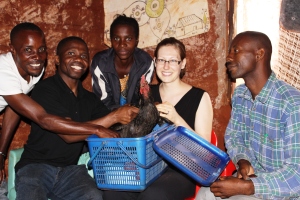
High school friends surprise us with an extremely generous, humbling gift. These friends graduated with my husband in 2000 and still live in the refugee camp. After high school, there are no educational opportunities in Nyarugusu. Copyright. All rights reserved.
Talking with my husband, though, who is himself a high school graduate from Nyarugusu, I was struck by how possible it is to provide hope – at least to some. A full 4-year university career costs about $5000 CDN in Burundi: this means $1250/year for 4 years. How can we say the situation is hopeless for Nyarugusu refugees when the required investment is relatively little? Many people invested in him as struggled to complete his university degree, and he is now a licensed social worker in Canada, and uses his profession to provide hope to others. As our plane touched down in Canada on May 16, my mind was already racing: what can I do? Who can help? There is great urgency to provide hope, especially for young people, who have no hope for the future unless they leave Nyarugusu. As a Canadian, so many times I have thought and heard others say: “There’s just so many problems in the world. What can we do? I don’t think much will ever change.” But changes in individuals’ lives create change in the family and community. Personally, I think it’s worth every effort we have. We have identified 5 people from the refugee camp who could start university in January 2015 if funds were available. We are now seeking partnerships with individuals, churches, and organizations to make this a reality. Please join us: ask questions, reflect on these realities, and consider what you might be able to do in response.
